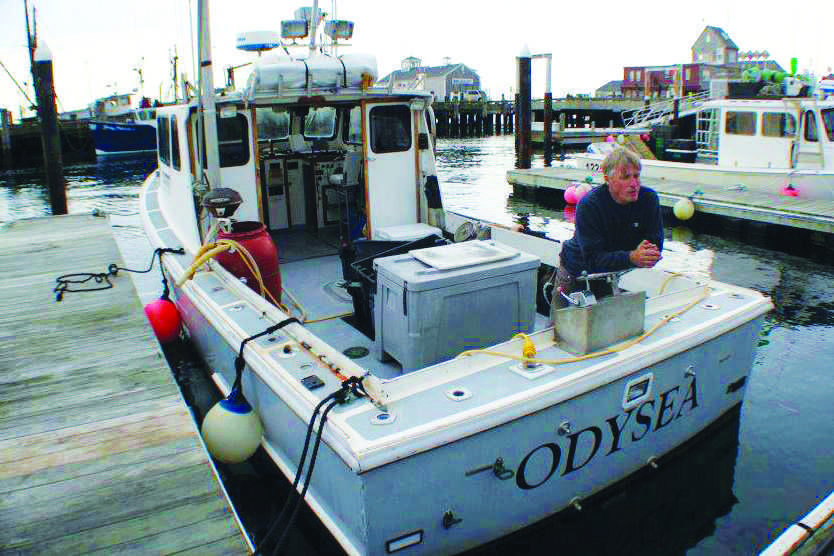Nat Geo Channel’s Captain Ralph Wilkins to Write Monthly Column
By Kaitlin McGuire
Coastal Angler Boston was proud to announce the addition of a reality television star to our staff. Ralph Wilkins, captain of the Odysea and cast member of National Geographic Channel’s smash hit Wicked Tuna, will join the Coastal Angler family as a contributing editor. Wicked Tuna is a reality series following the tough life on land and at sea of a group of skilled bluefin tuna fishermen sailing out of Gloucester, Massachusetts. The competition to make a catch is brutal, with every fisherman’s livelihood on the line as they pursue a disappearing species of valuable fish. Only the most skilled fishermen are up to the task and the exertions, day after day, of tuna fishing.
George K. Regan, proud publisher of Coastal Angler Magazine’s Boston Edition, promised “great insight” from Captain Ralph in a recent press release to announce the fisherman’s inclusion in the Coastal Angler lineup. “Captain Ralph’s knowledge of local waters is legendary, as are his stories,” Regan said. “He’ll provide great insight for our readers and exciting tales from his many adventures at sea.”
As part of Coastal Angler Magazine, Captain Ralph will write a monthly column, that’s sure to become a popular article among readers. Captain Ralph firmly believes that “all fishermen are natural-born storytellers,” and he plans to “hook” his audience every month with “a steady balance of humor and tips that my fellow anglers can use to land the biggest catch of their lives.” In addition to his writing contributions, Captain Ralph will also appear on behalf of Coastal Angler at boat shows and events throughout New England.
Those adventures started long ago, when Captain Ralph was just a boy. Though he now fishes out of Gloucester and Provincetown, Massachusetts, like so many of the Massachusetts commercial fishermen and recreational anglers before him, he began in Mid-Atlantic waters. Captain Ralph first fished in Sheepshead Bay in Brooklyn, New York, at the young age of seven, when his father would leave him at the pier to fish while the elder Wilkins went to work. He caught the commercial fishing bug early, heading out with far older and more experienced fishermen at 11 years old and pulling in the same 20-pounders the adults were catching. Later, Captain Ralph read about the bluefin tuna in New England’s waters and turned his sights to catching the elusive fish. He’s an accomplished hunter and fisherman, who took the largest blackfish ever on rod and reel, an 18.2-pound tautog that got him a feature in Long Island Fisherman magazine. Additionally, Captain Ralph holds a number of solo records, including a 2008 nod for a 980-pound tuna and another for the hooking of a 1048-pound monster in 2009, both of which got him highlights on the ESPN website. He is also a member of the US National Big Buck Club, a place he earned by taking down the largest whitetail deer ever in Otsego County, New York.
Captain Ralph joined National Geographic’s Wicked Tuna in its debut season. He quickly became one of the most popular characters on the show. Captain Ralph’s Odysea, moored in Gloucester, is the smallest of the five boats featured on the show, but what the boat lacks in size, her crew, under Captain Ralph’s leadership, makes up for in determination.
Tuna fishing is as much a part of the New England tradition as the Sox and the Pats, and the fishing occupation boasts much higher stakes than any sporting event. Fishermen have just ten weeks to make enough money to last them—and their families—the year, resulting in high tensions and plenty of drama for the cameras. One bluefin can bring in as much as $20,000, but such successful seasons come few and far between nowadays, with tuna populations dropping and a short and fickle fishing season.
Wicked Tuna seeks to highlight the struggle of real fishermen in Massachusetts, as well as the continuing plight of the bluefin tuna. Modern fishing methods are more often designed to catch large quantities of fish, in order to meet rising demands that too often trump conservation efforts. Preserving this species and the ocean these fish call home would take the joint efforts of multiple countries and communities that span the globe, as the bluefin tuna is a migratory species, and such a feat of international cooperation in the name of conservation would take enormous amounts of time and energy.
The fishermen who make money off the bluefin tuna, meanwhile, are fighting for their survival every day on the water, hoping for the top catch that will alleviate their financial woes. The fishermen of Wicked Tuna and their fellow fishermen up and down the coast adhere to United States guidelines that dictate acceptable size limits on fish and detail strict quotas on how big of a catch a fisherman may bring in. The bluefin population is just one-quarter what it was a mere sixty years ago, making commercial fishing an occupation of brute strength, which is needed to make the catch and make the money each family so desperately needs. But it also requires a solid head on one’s shoulders, in order to make the balance between what must be caught to survive and what can be caught to sustain the bluefin tuna stocks currently in Atlantic waters.
Wicked Tuna has had two successful seasons on the National Geographic Channel, with a third slated to start in early 2014. The show has aired new episodes on Sundays for the last few seasons, with reruns airing now on the National Geographic Channel on Friday mornings from 9 a.m. to 12 p.m. While you wait for Wicked Tuna to hit your TV screen, keep up-to-date on Captain Ralph Wilkins’ fishing exploits right here in Coastal Angler Magazine, beginning next month.


[easy-social-share]
